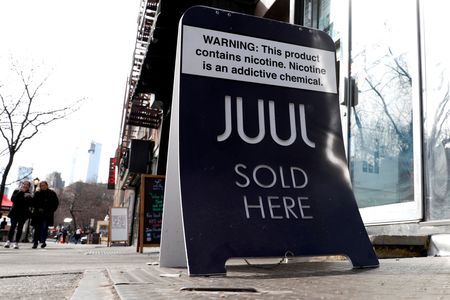

By Brendan Pierson
(Reuters) – Tobacco giant Altria Group Inc is set to face trial Monday in a lawsuit by San Francisco’s public school district accusing the company of fueling a teen vaping epidemic, along with e-cigarette maker Juul Labs Inc.
The San Francisco Unified School District says teachers and staff “have had to go to extreme lengths to respond to the ever-growing number of students using e-cigarettes on school grounds,” and is seeking to force Altria to pay for the cost of tackling the problem.
Altria, which held a 35% stake in Juul from 2018 until earlier this year, faces thousands of similar cases from individuals, local government entities and states. The San Francisco school district’s case was chosen by U.S. District Judge William Orrick in San Francisco, who is presiding over much of the litigation, as a bellwether or test case.
Next week’s trial before Orrick will mark the second time one of those cases goes before a jury. An earlier trial, in a case brought by the state of Minnesota, ended in a settlement on Monday as it was nearing its end, although the terms have yet to be disclosed.
“Most of the allegations raised in this suit occurred years before we made a minority economic investment in Juul,” Altria said in a statement on Thursday. “We believe this case lacks merit and will defend ourselves vigorously.”
The school district did not immediately respond to a request for comment.
The school district sued both Juul and Altria in 2019. It accused Juul of deliberately appealing to under-18 consumers with sweet flavors and eye-catching social media campaigns, and Altria of helping by letting Juul use its sales force and including Juul advertisements in its Marlboro cigarette products.
Juul has since settled the school district’s lawsuit and most of the similar claims against it, paying more than $1 billion to 48 states and territories $1.7 billion to individuals and local government entities.
Altria last month announced that it had given up its investment in Juul in exchange for some of Juul’s intellectual property. As of December, its share of Juul was valued at $250 million, down from $12.8 billion in 2018.
Juul in 2019 pulled most of its e-cigarette flavors from the market and halted much of its advertising under pressure from regulators. The U.S. Food and Drug Administration last June briefly banned the products, though it put the ban on hold and agreed to reconsider after the company appealed.
The head of the FDA’s center for tobacco products said last year that adolescent e-cigarette use in the United States remained at “concerning levels” and posed a serious public health risk. Federal health officials said last October that an estimated 2.55 million U.S. middle and high school students reported using e-cigarettes during a four-month span earlier in 2022.
(Reporting By Brendan Pierson in New York, Editing by Alexia Garamfalvi and David Gregorio)

